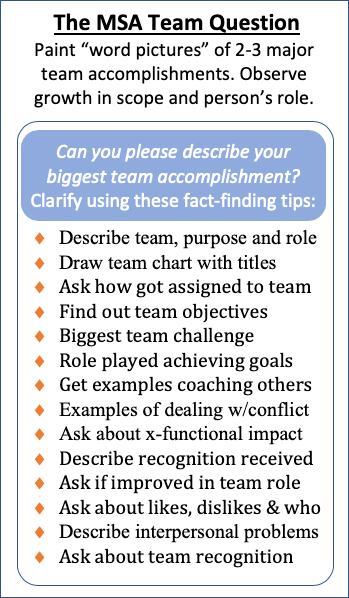Competency Models and Behavioral Interviewing Aren’t Good Enough
During one of our recent interviewing training programs one attendee suggested competency-based interviewing was the solution to all interviewing problems. I begged to differ. I contended that competency or behavioral interviewing wasn’t effective unless it was tied to a good understanding of the performance objectives of the job and the underlying environment. The point made was that just about everyone can give examples of when they used a competency like results-oriented, effective communication skills or being a supportive team player, but if these aren’t directly related to the actual requirements of the job itself, an accurate assessment is not possible.
“Hungry, Humble, Smart” for Team Skills Isn’t Good Enough
Another serious problem raised related to a hiring manager who excluded an outstanding candidate because the person didn’t seem “humble” enough. This concept is based on Patrick Lencioni’s book, The Ideal Team Player, in which the author argues that the best team players are hungry, humble and smart, and that all three are necessary before hiring someone. The big flaw here is that the hiring manager didn’t understand what “humble” meant in the context of the job. For this accounting management position, it meant collaborating with non-financial leaders and preparing financial reports that helped them better manage their own departments. It turned out the candidate was exceptional in this area but was never given a chance to explain it since the hiring manager thought the person was too “hungry” in the interview.
Here’s What Sherlock Holmes Has to Say About All of This
One excellent way to avoid these types of interviewing problems, including how to assess technical, managerial and “soft skills,” is by understanding the types of teams the person has been assigned to or has managed. This is what I refer to as the Sherlock Holmes deductive interviewing technique.
This introductory lesson to Performance-based Hiring includes a short video describing how non-technical people can assess technical competency using this Sherlock Holmes approach. It involves finding out why and how a person was assigned to different technical projects and what happened after the project was completed. Behind this is the idea that those with the strongest technical skills get assigned to stretch and important projects once they’ve proven themselves with the pattern continuing as long as the person hones these skills. It’s pretty obvious that the projects a person is regularly assigned is an accurate assessment of their competency since it’s made by those who work with and manage the person.
The same concept can be used to find “ideal team players.” During the interview ask what types of teams the person has been assigned, find out their roles on these teams and how this role changed on subsequent teams. You’ll quickly discover that the strongest team players have a pattern of getting assigned to important cross-functional teams which increase in importance over time. The graphic checklist from our Performance-based Interview course provides a good summary of the questions to ask to figure this out.

You’ll need to ask these fact-finding questions for the person’s past few jobs to fully understand the types of teams the person has been on, how the person’s role has changed, and the types of people the candidate tends to work with most often. Most important though is that with this approach you’ll find “ideal team players” who are hungry, humble and smart by using deductive techniques rather than trusting your intuition or the candidate’s personality and presentation skills.
Rank the candidate high on team skills if the types of teams the person has been assigned are reasonably comparable to the types of teams the person will likely be working on in the new role. However, in order for this technique to work it’s important to conduct some type of job analysis before the requisition is approved.
Our approach to preparing an effective performance-based job analysis starts by asking the hiring manager, “What does the person in this role need to do to be successful and who will the person be working with on these projects?” This usually results in 5-6 performance objectives describing the tasks, the teams and the expected results.
While a structured behavioral interview is an effective tool for minimizing bias, it is far less effective for assessing actual on-the-job performance, fit and motivation unless the assessment is made based on a detailed job analysis. However, when combined with Sherlock Holmes’ deductive interviewing techniques, assessment accuracy soars. And when it comes to team skills, this is one trait that should never be compromised.


